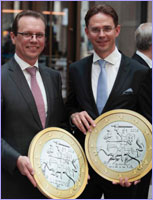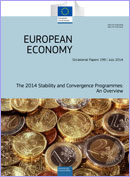|
|
|
|
|
|
 |
 |
 |
 |
Council gives green light for Lithuania to adopt the euro on 1 January 2015
The Council has taken the decision needed for adoption of the euro by Lithuania on 1 January 2015, making the country the 19th member of the euro area. The Council also set the permanent conversion rate at 3.45280 Lithuanian litas to the euro. This corresponds to the current central rate of the litas in the EU's exchange rate mechanism. The decision taken on 23 July follows the overwhelming endorsement by the European Parliament on 16 July and by the European Council during its meeting of 26-27 June. This decision was celebrated on 23 July at an event with speeches by Vice-President of the European Commission Katainen, Commissioner Semeta, Lithuanian Prime Minister Mr Butkevičius, Lithuanian Minister of Finance Mr Šadžius, Member of the Executive Board of the ECB Mr Praet, Governor of Central Bank of Lithuania Mr Vasiliauskas, and State Secretary for European Affairs for the Italian Presidency Mr Gozi. The event was also attended by Vice-President of the European Commission Kallas and many key Council officials and was widely covered by mostly Lithuanian media. The “14th Report on the practical preparations for the future enlargement of the euro area” focuses its findings on Lithuania and was released on the same day that the final decision was taken. The report notes that practical preparations for the changeover to the euro in Lithuania are progressing well but that there is room for further progress in some key areas in order to protect the interests of Lithuanian citizens.
|
 |
 |
 |
|
 |
 |
 |
 |
 |
|
 |
 |
 |
| With the accession of Lithuania this year and Latvia last year all three Baltic States will be in the euro area and share the same currency. The transformation of the Baltic States since their still quite recent independence is truly remarkable. European integration has played a major part in this transformation by opening up possibilities for prosperity and trade. |
 |
Jyrki Katainen, Vice-President for Economic and Monetary Affairs and the Euro
|
|
|
|
 |
 |
 |
 |
Jean-Claude Juncker elected President of the new European Commission by a large majority
On 15 July Jean-Claude Juncker became the President-elect of the new European Commission. Mr Juncker was elected by a strong majority of 422 votes in the European Parliament plenary session. The new Commission is scheduled to take office on 1 November. Juncker was proposed as candidate for Commission President by the European Council on 27 June 2014, and required to be elected by a majority of at least 376 votes in the European Parliament. Addressing the European Parliament plenary ahead of the vote, Mr Juncker presented his political guidelines for the next European Commission as set out in a document entitled A new start for Europe: My agenda for Jobs, Growth, Fairness and Democratic Change. Building on the European Council conclusions of 27 June Strategic agenda for the Union in times of change, Juncker’s agenda will focus on ten policy areas while his “number one priority and the connecting thread running through each and every proposal will be getting Europe growing again and getting people back to work.” He announced his intention to present, within the first three months of his mandate, a “Jobs, Growth and Investment Package” to generate an extra EUR 300 billion in investment over the next three years.
|
 |
|
 |
 |
|
 |
 |
 |
 |
Jyrki Katainen appointed Vice-President for Economic and Monetary Affairs and the Euro
Jyrki Katainen has taken up his duties as Vice-President for Economic and Monetary Affairs and the Euro after the European Parliament on 16 July overwhelmingly approved the candidature of Katainen and three other European Commissioners, with 421 votes in favour. Katainen, who was formerly Prime Minister of Finland and chairman of the National Coalition Party, succeeds Siim Kallas, who has been acting Vice-President since Olli Rehn resigned from the European Commission in order to take up a seat in the European Parliament on 1 July 2014.
|
 |
|
 |
 |
|
 |
 |
 |
 |
Joint Commission, ECB, IMF team visits Athens to lay the groundwork for fifth review of Greece’s adjustment programme
A joint team from the European Commission, European Central Bank, and the International Monetary Fund has concluded a visit to Athens to take stock of recent developments and lay the groundwork for a full mission to conduct the fifth review of the programme. The fourth review mission was completed on 19 March and its conclusions were approved by the Eurogroup on 1 April. The Eurogroup then approved the launch of national procedures to pave the way for approval of the next European Financial Stability Facility (EFSF) instalment of EUR 8.3 billion to be paid out in three tranches. Following the disbursement of two tranches of EUR 6.3 billion and EUR 1 billion respectively, the last tranche of EUR 1 billion is expected to be paid out after implementation of a further set of milestones agreed with Greece. The full mission for the fifth review will reconvene discussions in the second half of September.
|
 |
|
 |
 |
|
 |
 |
 |
 |
Seventh Activity Report of the Task Force for Greece: reforms delivering results
The Commission's Task Force for Greece (TFGR) has published its seventh activity report. The report published on 23 July confirms a stepping up of technical assistance in the period February to May 2014. Technical assistance has helped to advance implementation of the reforms under the Economic Adjustment Programme. TFGR members have been working in a number of Greek ministries, offering their expertise and effectively coordinating the work of the providers of technical assistance from Member States, international organisations and other Commission services. Technical assistance has particularly intensified and begun to deliver results in key areas such as tax administration; management of EU Structural and Investment Funds; financing for SMEs and public investment; modernisation of the health service; reform of the public administration; labour market reform; improving the business environment; and combating money laundering and corruption.
|
 |
|
 |
 |
|
 |
 |
 |
 |
Eurostat releases a new set of economic globalisation indicators
The globalisation of the world economy creates new needs for statistics. Therefore, Eurostat, the statistical office of the EU, has published a new set of economic globalisation indicators based on data already available in the Eurostat database. The indicators are described in a news release issued on 15 July. They identify five aspects of economic globalisation: international trade, foreign direct investment (FDI), employment and value added of multinational enterprises as well as internationalisation technology. All in all, twelve indicators are included in the new framework, of which four are shown in the news release. One of the seven flagship initiatives of the Europe 2020 strategy is to have an “industrial policy for the globalisation era”, which means to support the development of a strong and sustainable industrial base to compete globally. Reliable indicators of economic globalisation and its impact on the EU economy are essential for the effective implementation of this policy.
|
 |
|
 |
 |
|
 |
 |
 |
 |
Commission invokes powers under “Six-Pack” legislation to open investigation into statistical reporting in Valencia
The European Commission has decided to launch a formal investigation into the possible manipulation of statistics in the region of Valencia (Comunidad Valenciana), Spain. The Commission is not calling into the question the accuracy of statistics in Spain as a whole. The investigation launched on 11 July will examine whether deliberate or seriously negligent misreporting of expenditure in the region caused Spain's national debt and deficit data to be misrepresented over several years. This is the first time that the Commission has drawn on its new powers from Regulation 1173/2011 (Article 8) under the "Six Pack" economic governance legislation to investigate suspected manipulation of a Member State’s debt and deficit data. If manipulation is confirmed, the Commission may apply appropriate sanctions. The opening of an investigation, however, does not prejudge the outcome.
|
 |
|
 |
 |
|
 |
 |
 |
 |
Sixth round of EU-US Transatlantic Trade and Investment Partnership negotiations concludes in Brussels
The sixth round of EU-US trade talks, the Transatlantic Trade and Investment Partnership (TTIP), concluded in Brussels on 18 July. The highly technical talks addressed “classic” market access issues such as tariffs, services and public procurement, as well as non-classic areas such as the regulatory agenda. Substantial time was devoted to the latter as it is considered to be the most economically significant part of TTIP and what makes TTIP different from the other trade agreements. The negotiators discussed how to ensure close regulatory cooperation in such areas as standards and conformity assessment, as well as on sanitary and phytosanitary (i.e. relating to plant health) matters. Discussions were also held on sustainable development/labour, the environment, energy, and SMEs. Negotiators are currently focusing on nine sectors, including pharmaceuticals, cars, chemicals and engineering. During the week, negotiators also met with over 400 representatives of civil society.
|
 |
|
 |
 |
|
 |
 |
 |
 |
European Youth Employment Initiative allocates EUR 1.1 billion of EU money to tackle youth unemployment in Italy
On 11 July, the European Commission adopted the national operational programme for the implementation of the Youth Employment Initiative (YEI) in Italy. This is the second YEI operational programme adopted by the European Commission (the first was adopted for France on 3 June), as part of the EUR 6 billion Youth Employment Initiative for which 20 Member States (with regions with youth unemployment over 25%) are eligible. Under this programme, Italy will mobilise EUR 1.5 billion from various sources, including EUR 1.1 billion from the EU budget (from the Youth Employment Initiative and the European Social Fund), to help young people to find a job. The Operational Programme will mainly contribute to implementation of the Youth Guarantee, the ambitious EU-wide reform aiming to ensure that every young person up to 25 years is presented with a quality offer of employment, education or training within four months of becoming unemployed or leaving formal education.
|
 |
|
 |
 |
|
 |
 |
 |
 |
Commission Representation in Malta discusses the 2014 Country-Specific Recommendations with representatives from government, social partners and civil society
Conscious that the European Semester’s success improves if society's representatives are engaged and take ownership of the process, on 11 July the Commission Representation in Malta organised a roundtable discussion on the 2014 Country-Specific Recommendations for Malta. The full-day event provided an opportunity for the Commission not only to present its assessment but also to exchange views with stakeholders on the economic challenges facing Malta. Five panels comprising staff from DG ECFIN, EMPL, TAXUD, EAC, and SANCO as well as academic speakers discussed the recommendations with 40 participants representing some 25 different organisations from government, social partners and civil society. The involvement of staff from multiple Commission services reflects the broad nature and range of recommended policy actions. The themes discussed included fiscal consolidation, pensions and healthcare reforms, the labour market and education, energy and competitiveness. Similar events coinciding with key stages of the European Semester are being planned.
|
 |
|
 |
 |
|
|
|
|
 |
 |
 |
 |
The 2014 Stability and Convergence Programmes: An Overview. European Economy. Occasional Papers 199.
This paper provides an overview of Member States’ 2014 Stability and Convergence Programmes (SCPs), with a focus on fiscal consolidation plans over 2013-2017. It serves as background for the examination of the SCPs against the requirements of the Stability and Growth Pact – both the corrective and the preventive arm – and provides a global, aggregated view of fiscal policy plans in the EU and the euro area as a whole.
|
|
 |
|
|
|
|
|
|
|
|
|
|
|
|
|
|
|
 |
| Directorate-General for Economic and Financial Affairs |
 |
|